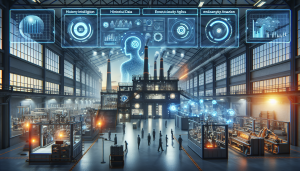 UseCasesFor.ai
UseCasesFor.ai
Choose Topic
 UseCasesFor.ai
UseCasesFor.ai
AI Use Cases
A collection of over 250 uses for artificial intelligence
A continually updated list exploring how different types of AI are used across various industries and AI disciplines,including generative AI use cases, banking AI use cases, AI use cases in healthcare, AI use cases in government, AI use cases in insurance, and more

Sign up
to receive a PDF containing all the use cases and stay updated with the latest AI trends and news (you can always unsubscribe)
Production optimisation

Introduction
In the current world where the manufacturing industry is constantly changing, the implementation of Machine Learning (ML) and Artificial Intelligence (AI) has been recognized as one of the most effective ways of improving production. The integration of these advanced technologies with the conventional manufacturing methods is therefore helping to develop better and more effective systems. The application of ML AI in production optimization is a revolutionary step that has been slowly but surely transforming the manufacturing sector and leading to the adoption of what are commonly referred to as smart factories or Industry 4.0. This transformation is defined by the capacity to foresee, alter and respond to variations and thus, is changing the face of production lines and the ways in which efficiency and output can be achieved.
Challenges
There are, however, some challenges that hinder the effectiveness of implementing ML AI in the manufacturing industry despite the huge opportunities that it presents. A major challenge that is likely to be encountered is the issue of data collection and management. This is because manufacturing environments create large data sets and the problem lies in identifying, organizing and analyzing this data in order to gain valuable information. Also, the integration of AI into current systems can be complicated and costly since it may need a lot of funds to be invested. Another challenge is the shortage of talent because the development and implementation of AI depends on many factors including the technological know how and the knowledge of the manufacturing process. Also, there are concerns on data security and privacy, the interpretation of AI recommendations, and the issue of meeting certain set regulations.
AI Solutions
There are various applications of AI solutions in manufacturing that solve different problems and create new opportunities for improving the production system. One of the most effective uses of AI is in predictive maintenance which is made possible by machine learning algorithms. This helps in avoiding down time since equipment failures can be identified before they occur. The capabilities of AI in understanding and interlinking data make it efficient in quality control where it is used in identifying defects or variations in products that cannot be easily detected by humans. It can also help in optimising the supply chain by forecasting demand, managing inventory and reducing costs and wastage. An example of this is Siemens’ use of AI for predictive and preventive maintenance of systems thus minimizing production losses. In a similar manner, General Electric employs AI in the management of its supply chain and production and this has led to efficient and effective costs and time in delivery.
Benefits
There are a vast number of benefits of implementing ML AI in production optimisation especially in the manufacturing industry. Some of the advantages are better efficiency and production rates, lowered operation costs, enhanced quality of products, and better decision-making processes. The predictive analysis of AI can greatly minimize on maintenance expenses and time as well as avoid the expensive down time. Quality control can be enhanced thus minimizing on wastage and increasing the customers’ satisfaction. However, AI can help in providing a better understanding of the market demand, and hence, the manufacturers can optimize their inventory and reduce waste. Also, the information derived from AI can help in the formulation of strategies that will enable the manufacturers to change with the market trends easily.
Return on Investment
It can be expensive to implement AI, but the benefits are worthwhile. The cost of operations, enhancement in efficiency, enhancement in product quality, and generation of better decisions are some of the benefits that can lead to positive ROI. Also, AI will allow manufacturers to come up with new business models and revenue streams hence improving on their ROI. According to McKinsey, predictive maintenance through AI can cut maintenance expenses by 10-40%, reduce downtime by 50%, and increase equipment’s lifespan by 20-40%. Also, according to Accenture, AI has the potential of increasing profitability within the manufacturing industry by 39% by the year 2035.